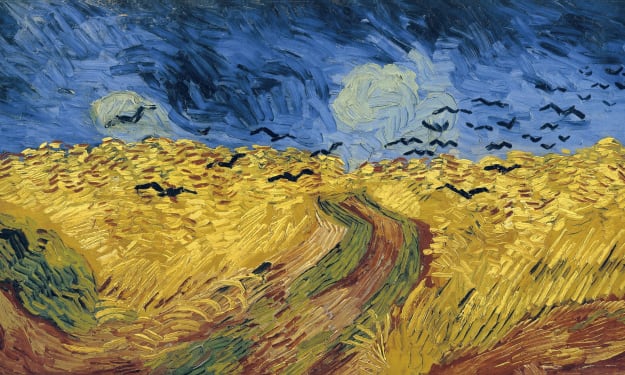The Evening Primroses
There is something that I want to convince you still exists in this world.

I.
Take the slats on Haven’s east end picket fence, for example. Go there tomorrow. The wind will be running, whistling, where the fence begins by the duck pond and the sunlight is undivided and strange and mottled. Follow it through the trail that cuts behind the high school where the apple trees grow, but don’t eat the apples; they’re sour.
When the old paint on the fence gets brighter and there are fewer broken pieces the library will be near. Be careful crossing the street. This is where traffic is thick during a summer afternoon. The fence goes past the library and after a brief break for the train tracks it continues all the way through the factory neighborhoods and disappears in a tangle of thickets.
Take the slats, though, before the library—where the fence happens to run parallel with the sidewalk on a broad street. Here, the houses are big boxes sometimes of brick and sometimes of white wood.
Now that the sun is setting, at this time of year, the fence on Haven’s east end is a good example. The yellow, which is brighter than white, divides up between the gaps in the fence-slats and when Linda runs, the warmth of the setting sunlight as divided through the slats patterns on her hair and cheek.
Linda is not taller than the fence. When she runs as fast as she does here, with little to ballast her against the pavement of the sidewalk, she reaches the library in no time at all and stops carefully at the crossing where the traffic is busy (though this late in the day the way is clear), watching the turrets soar between the canopies of the oak trees.
The library has turrets. It has towers capped with pointed roofs and running ramparts around the edges between the towers, and before the entrance runs a dry gully with a wooden bridge. Linda walks slowly across the grass to the bridge and on the other side passes through the large oak doors and into the dim, cool lobby. She seeks out the farthest shelf and the farthest corner of the shelf and there takes out a bag of teeth.
Linda’s bag of teeth is hidden between the last two books when it is not in her hands.
“Slivovitz,” she whispers. “Mouflon. Egregious. Syringa.”
She speaks lowly so that the librarians will not hear her. And then, suddenly, comes a crashing of thunder. Linda gasps, and listens closely. The sunlight dims and fades and falls beneath a corner of the horizon. Librarians move along the rows of shelves, switching on the lights at the ends. Linda listens. Rain falls east. The only noises in the library are the shuffling of the librarians’ feet and a soft voice coming from the Kids’ Corner, where a young lady reads to upturned faces. Linda peers that way through the gaps in the shelves, over the tops of books: the young librarian sits with her back to the window and reads in the light of the bright evening clouds. Her face grows animated and her eyes wide, and she turns the book toward the children after every sentence, and they gasp.
Linda puts the bag of teeth in her pocket, and walks slowly toward the Kid’s Corner, careful to keep away from the glow of the little orange lamps and the rainy light from the windows. Now she can hear.
“And Davy Crockett said to the bear, ‘Go home, go home, I’m not scared!’ but the big brown bear said ‘No! I’m hungry, and you look good to eat.’”
Linda grasps the bag of teeth tightly in her pocket. Davy Crocket’s presence is thick in Haven, and she had known it from the moment she’d found the teeth.
The children gasp.
“…the bear turned to go home, with his tail between his legs. And Davy Crockett—“
“Bears can’t put their tails between their legs,” Linda says suddenly.
A contingent of faces turn in one shuffle, and the young librarian looks up.
“They’re too short. And Davy Crockett did not send the bear home. He Kilt the Bar, beneath a tree, year of 1803.”
A rattle of lightening lights up their faces.
II.
“The storm comes just after Linda leaves.”
“Don’t worry, Aunt Kate. She got there before the rain started.”
And this speaker, the older one: do you remember her? You must. It was her, by the fireplace, at the party we never forgot. She is another example, very good, like the fence slats. She wears yellow and blue and smells like coconut.
“You think she did?”
“Oh yes, Aunt Kate, I know she did. Linda is a fast runner.
And she knew it was going to rain so she went very fast this time.”
“She does go fast, doesn’t she?”
Her son (who addressed her, like Linda, as ‘Aunt Kate’) skipped out of the kitchen, and then she was alone.
Soon they would begin to come: the first ones, nervous and offering bottles and being too careful with their coats and odd about where to sit down.
And we would have come too, you and I.
So now you begin to see.
Aunt Kate, the one with the coconut neck and the dress with yellow and blue, she’s an example of what I wish to convince you can still be found in this corner of the world.
Aunt Kate stands by the sink and it is in this condition that Linda remembers her and will always remember her, she tells me: engulfed in ceramic bowls and silverware and pots and pans: a frozen tumble of a kitchen—and always she is still, and her hair is half lost in the light of the window above the sink. The bright clouds shine in and around her. She can stand there for hours and then Linda takes her by the hand and brings her over to the table and sits her down, and then brings the dishes in after her, and the sight of the dishes springs Aunt Kate back to her feet.
Linda says that she understands these fits now, but I’m not so sure. It seems to her that there in the kitchen on a street in a city by a highway where other cities run in a corner of the state by the water
where other states cuddle, buried by such a busy weight, and by the tiny things like the angle of a fork against the edge of the sink, we stand still as stone, and let the burden pass like the rattling pans on a merchant’s cart. Just bevel the edge of that heaviness, glide, like a branch can trace a cloud.
It seems to Linda necessary. It seems to me sickness. Whatever it is, it is an example of what I wish to convince you still exists in Haven.
III.
Davy Crockett is a presence here.
The blackbird soared above Linda. She stood under the overhang of the library roof before the front doors, and the blackbird was up in the rain. The blackbird twisted in the air, beveled the purlieus of cloud, as if tracing the branches of a tree. The library turrets clutched, anxious at the climb, and the wind roared.
Water runs through the gully and stains the wood bridge dark wet. Aunt Kate is out on the veranda, taking down the flowerpots so the flowers don’t over drink.
“Oleander. Dogbane. Cardiotonic. Edge.” Linda felt the teeth in her pocket and peered out over the grass—the dim pewter outline of Davy Crockett lurked behind the rain, among the oaks, arms aloft, daring lightening.
IV.
The key is 7.5 centimetres long and one exact millimetre wide. It is made mostly of nickel. It was cut in a shop since closed that stood near where the old movie theater is in Flagstaff, Arizona. Its edge pivots inward two millimetres, outward three, runs for a centimetre, pivots inward twice again
then tapers off to meet the point. The key cut its first owner under the nail of the thumb and even now it still has blood particles at the point. Its first owner was the Haven game warden for a period of three years. The point has since dulled. Its second owner’s beagle ate the key and passed it in the backyard, beneath an oak tree, where it stayed unnoticed for ninety-nine years, surviving eighty blizzards, one-hundred and seventy neighborhood dogs (considering a ‘neighborhood dog’ to be any dog sleeping regularly within a mile), and a house fire, until Linda, dancing barefoot in the park by the burned out house-foundations on the east end, cut her left sole on something sharp (but not so sharp as it once was). The key gave Linda tetanus, and though she had to spend three days in the hospital Linda told everyone that she didn’t know what had cut her.
She keeps the key in a plastic bag and hides the plastic bag between two dictionaries in a rarely frequented corner of the Haven Public Library, which was designed to resemble a castle by Charles Newton Jr., an architect brought in from England. Charles Newton Jr. was educated at Shrewsbury College, and graduated at the bottom of his class with paint-stains on his shirt
and hands covered from fingertips to wrists in eczema. He died in Haven at the age of eighty-nine and was buried in his backyard, which now belongs to Kate Sloan, whose younger sister married Donald Sunfeather in Flagstaff, Arizona (where the key was first cut), and came back to Haven with alimony and a baby girl.
Kate’s sister died one night the following winter. She had dropped the girl off at her aunt’s, gone home, opened every window in the house, took a shower of cold water, and lied naked on the hardwood kitchen floor. She had been convinced since visiting Arizona that the setting sun had set her skin on fire.
V.
You want proof? Come with me.
The fence ends at the foot of a broad pasture, which swoops down to a line of tall maples and an old barn that huddles in their shadow. We’ll walk; the dead grass, matted against the hard soil by autumn cold, will brush our ankles.
In the barn is an ax, a pile of hay bleached to powder-white by time, and the body of a fox. The fox has been dead for not less than twelve hours. Scarlet footprints lead from the barn floor, which smells damp (humidity is gathering ahead of the storm), to the edge of the maple trees.
Standing here by the trees, looking in, is like pressing your ear against your lover’s chest.
We can’t step forward. Let the red leaves fall. What’s done is done.
Behind us, in the barn: this is what still exists. Mad, pointless endeavor. Guttural protestations of life. Acts that follow no plan. Life tumbling on life. Lack of logic. Pain that is so great, people can see it on you. Pain that is an ax leaning against a post, and a fox not twelve hours dead.
Nothing is more important than what is in this old barn.
VI.
Linda is a teacher at a high school in Arizona. She never had kids. She lives with her partner and, as far as I know, has never been back to Haven.
She does not know that the key in her plastic bag belonged to the first Haven game warden, or that it was cut in the city where she was conceived, or that it is meant to unlock the time capsule hidden inside the base of the statue of Davy Crockett, which was sculpted by Charles F. Newton Jr, who died with eczema covering his entire body.
About the Creator
Eric Dovigi
I am a writer and musician living in Arizona. I write about weird specific emotions I feel. I didn't like high school. I eat out too much. I stand 5'11" in basketball shoes.
Twitter: @DovigiEric






Comments
There are no comments for this story
Be the first to respond and start the conversation.